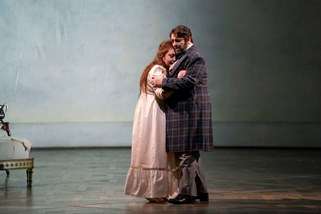|
Back
Traviata Returns to Chicago Chicago
Lyric Opera of Chicago
02/16/2019 - & February 20, 24, March 1, 4, 7*, 10, 13, 16, 22, 2019
Giuseppe Verdi: La traviata
Albina Shagimuratova (Violetta), Zoie Reams (Flora), David Weigel (Doctor Grenvil), Christopher Kenney (Marquis d’Obigny), Ricardo José Rivera (Baron Douphol), Mario Rojas (Gastone), Giogrio Berrugi (Alfredo), Lauren Decker (Annina), Eric Ferring (Giuseppe), Zeljko Lucic (Giorgio Germont)
Lyric Opera of Chicago Chorus, Michael Black (chorus master) Lyric Opera of Chicago Orchestra, Michael Christie (conductor)
Arin Arbus (production), Riccardo Hernandez (sets), Cait O’Connor (costumes), Marcus Doshi (lights), Austin McCormick (choreography)

A. Shagimuratova, G. Berrugi (© Todd Rosenberg)
Invidious comparisons to the film Pretty Woman notwithstanding, Verdi’s seminal La Traviata remains the modern tragic love story par excellence. Propriety forces poor Violetta to leave Alfredo, her only true love in a life of decadence, whose boundless anger is only quenched when he learns the truth as she is dying and returns to her too late. “Relevance” drips from the pages of its score, or at least attracts enough people that it figures as one of the most frequently performed works in the repertoire, sometimes to the point where it can seem inescapable. The Lyric Opera of Chicago’s program for this revival features a sizeable photo of the ill-fated Princess Diana, whose life story was rather different, but still evokes ideas of tragic love, at least to her admirers. Verdi’s own scandalous relationship with the singer Giuseppina Strepponi, a woman with a past whom he eventually married, paralleled in some ways Alexandre Dumas’s “lady of the camellias,” but anyone who has been in a tough romantic spot can probably find something in the opera.
Chicago has revisited its repertoire production, last seen five seasons ago, by the theater director Arin Arbus. It is an austere affair. Sets are barebones throughout. The first and third acts happen inside a virtually empty drawing room confined in a semicircular gray wall whose only purpose is to receive shadows of the main characters. Are we seeing them in life writ large, or in some imprint of memory? The question is never really answered, though Violetta’s miming to the strains of the prelude, which plays the operas major themes in reverse, suggest we are going back in time. The rapturous second act plays out in period settings, but again depends heavily on somber tones. Cait O’Connor’s costumes are true to the opera’s nineteenth century milieu, but also seem a bit drab. The only hint of color for the male leads comes at the very end, when they visit the dying Violetta dressed for some reason in plaid.
The title role of Traviata is treacherous – really it requires three vocal types in one, as Violetta migrates from coloratura soprano in Act I, to dramatic soprano in Act II, to waifish soubrette as she dies in Act III. Albina Shagimuratova returned to Lyric to sing the role for the first time here, after having slowly built a solid career in higher soprano parts on stages around the world. A solid chest voice centered her approach to the vocal demands of each act with a crystal clear delivery. The first act coloratura runs were a bit thin, but she proved more than credible for the part at least in voice. Her dramatic delivery never really quite took off. Her Alfredo, the Italian tenor Giorgio Berrugi, is one of those sweet-sounding singers who seems natural for the part of a sincere lover who takes his jilting with an emotional collapse. In the tender moments this worked, but when the demands were on, he faltered where a more robust voice might have succeeded. He bore out this observation in Alfredo’s biggest moment – his second act double aria. The light and happy “Dei miei bollenti spiriti,” in which he basks in the glow of his rural idyll with Violetta, resounded joyously, but the tortured cabaletta “O mio rimorso,” in which he confronts the towering expense he has caused her, lacked power and conviction. Zeljko Lucic might now be the world’s reigning Verdi baritone after the demise of Dmitry Hvorostovsky. He sang the role of Alfredo’s father, Giorgio Germont, with cruel authority at first, but melted into paternal sensitivity when the drama called for it.
Michael Christie’s conducting lacked energy but got the music out. Only in the final moments of the opera did he seem to bring the orchestra together with the power that a great Verdi ensemble requires. He may have been hindered by the metallic buzzing sound of someone’s errant hearing aid, which persisted through this matinee performance despite a heroic intervention by an usher, but many of great moments were lost.
Paul du Quenoy
|